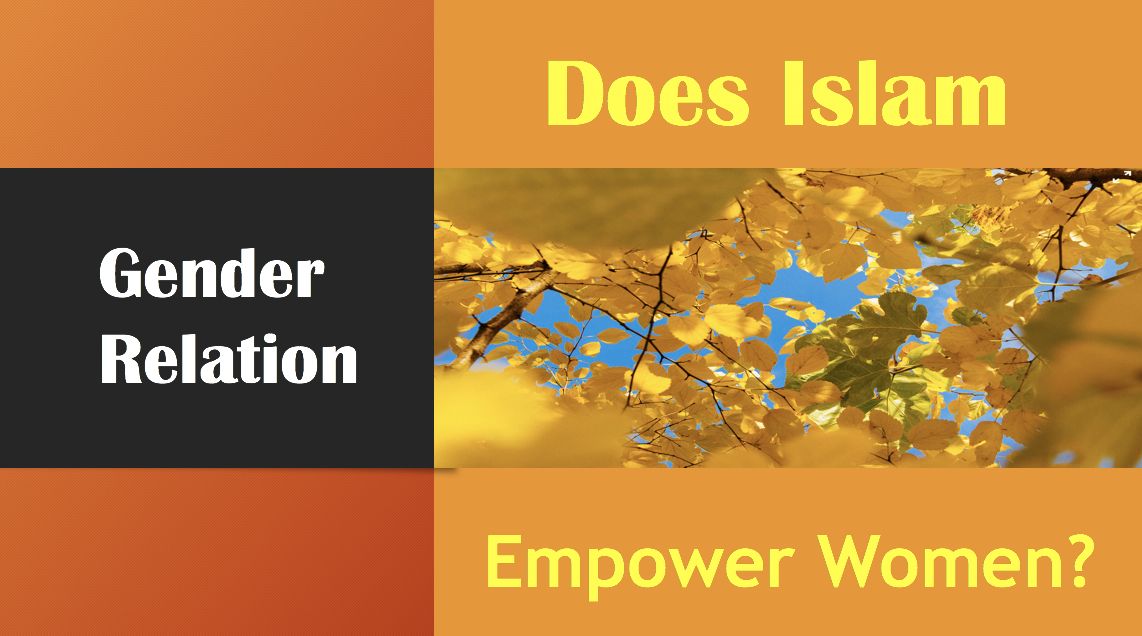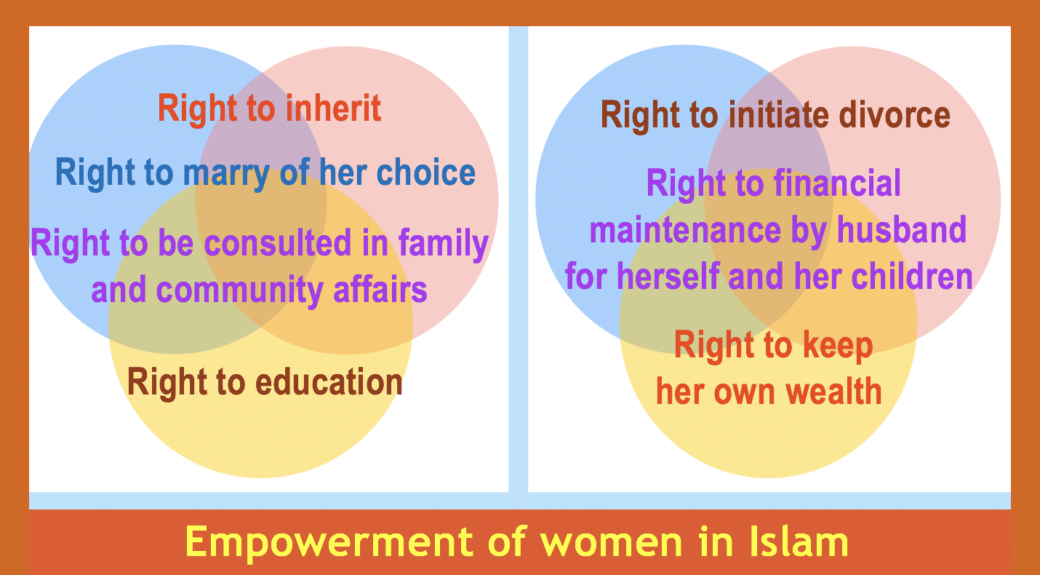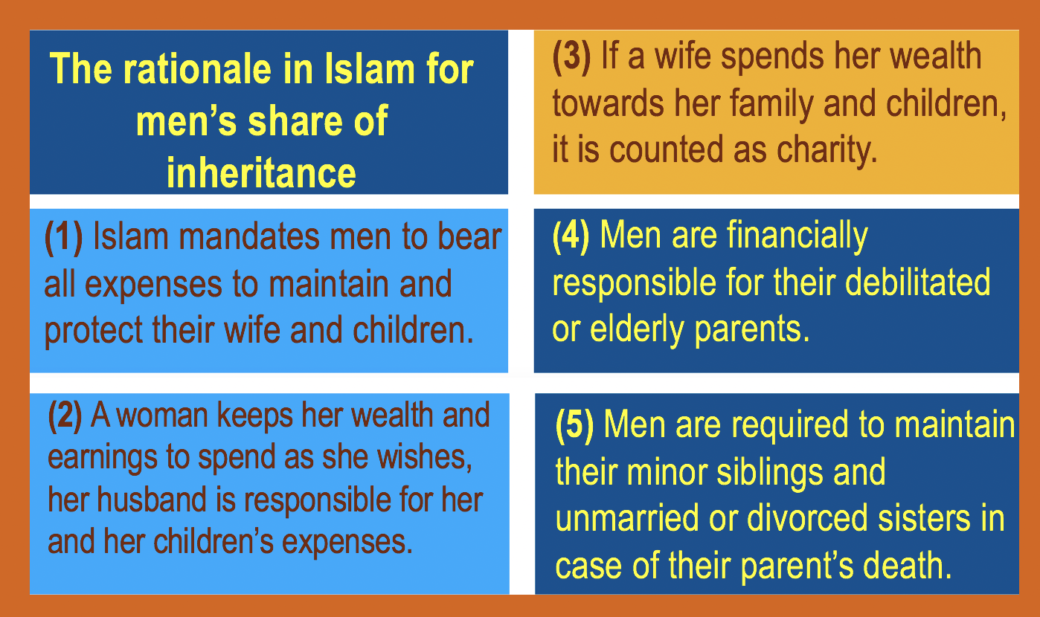
Women in seventh-century Arabia
The Quran was revealed to the seventh-century patriarchal Arabian society when men were the absolute monarchs of the family, and women were seen as objects to be owned. Because a son was physically stronger than a daughter and contributed to a stronger workforce, people preferred sons to daughters. Consequently, female infanticide was in rampant practice. The female literacy was near zero.
If a husband died, his legal heirs would inherit the wife and keep her as a prisoner. They would not let her go free unless she abandoned claims to her property in their favor. If they wanted, they would marry her against her will. Islam abolished these horrific practices of owning women against their will and abolished female infanticide. https://qpeace.net/?p=4064
“Quran 16: 58-59 “…When news is brought to one of them, of (the birth of) a female (child), his face darkens, and he is filled with inward grief! He hides from the people because of the bad news he has received. Should he keep it in humiliation or bury it in the ground? Unquestionably, evil is what they decide…”
Women under Mosaic laws in the seventh century
- Inheritance went to the sons. That is to say that daughters could inherit only in the absence of a son. Sons had the responsibility to ensure the care of both mother and sisters.
- Women were not allowed to serve as a witness in financial cases or capital crimes
- Women were not allowed to serve as a priest (Kohen) in the Temple.
- (4) Women could not be the reigning Queen; the monarch had to be a male.
- The wife could not divorce; only the husband could. https://en.wikipedia.org/wiki/Legal_rights_of_women_in_history6
How did the Quran empower women

Diverging Responsibilities
Man and women are dissimilar in their physical and psychological formation. It is important to realize that their physical and psychological needs and abilities are not precisely identical. The Quran placed the same moral, spiritual, and ethical obligations to both men and women. The responsibilities diverged where there is a difference in body-physiology and physical build.
Women can carry babies and breastfeed them, while men can not. Average men are physically larger and stronger than average women. Consequently, their responsibilities to society diverged in these aspects. The Quran made men responsible for protecting and supporting women and dealing with them in kindness. Society needed men’s physical strength to protect wealth, to earn a livelihood by grazing animals, cultivating farmlands, or traveling as merchants. These were more of a male domain in ancient times. At the same time, women, in general, who were more vulnerable to the harsh realities of the outside world, were involved with domestic responsibilities, including managing household works and raising children. The divergence in responsibilities was not solely due to anatomical and physiological differences but also due to ancient times’ social-cultural fabric. https://qpeace.net/?p=314
Making it fair

Rationale For the Quranic Approach to Inheritance
The Quran mandated inheritance for women from their parents. Certainly, this was a revolutionary idea in Arabia at the Prophets’ (Peace be on him) time. A male sibling received double the share of a female sibling. In the present day, this is a lightning rod for an outsider to the religion. Firstly, this provision is in a context that a man in Islam has to take care of the family’s expenses, including his wife, children, and his own parents. Secondly, women are not accountable for any of these responsibilities. It must be remembered, a woman’s earnings belong to herself, and she can spend her wealth as she wishes. Furthermore, if she spends anything towards her children or husband, it will be a charity from her side. To sum up, all her and her children’s expenses remain her husband’s permanent responsibility, while her own wealth remains hers’ only.
Access to education
One of Allah’s names is “Al-Alim,” which means “the Most Knowledgeable.” Earning knowledge leads us towards greater closeness to Allah. Prophet (Peace be upon him) emphasized access to education equally for both men and women. Prophet (Peace be upon him) said, “acquiring knowledge is obligatory to every Muslim.” Motherhood is given the utmost respect. The Prophet (Peace be upon him) stated that, for children, heaven lies under the feet of their mother.
Empowering Women in Islam: Index
- Does female witness merit half the male witness? Discussion on male and female witnesses in the Quran. Follow the link: https://qpeace.net/?p=314.
- Is it fair that men get double the women’s share of the inheritance? How Does Islam Empower Women? Follow the link: https://qpeace.net/?p=5034.
- Myths About the Status of Women in Islam. Follow the link: https://qpeace.net/?p=4064

2 Trackbacks / Pingbacks